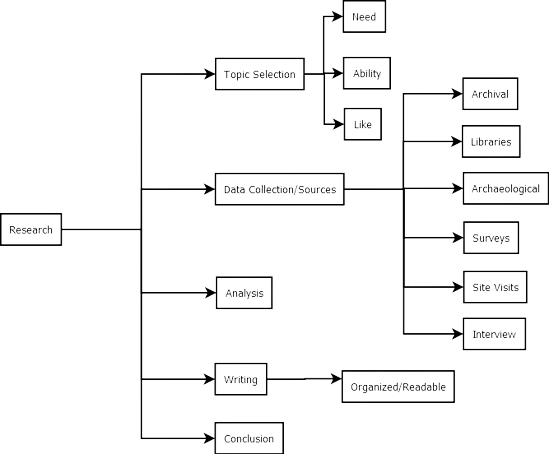
Research is enriching process for subject as well as for researcher and institution. Discovery of new information, aspect or relation between existing facts/factors/aspects could be consider as research. I think following points are useful in introductory understanding of research in History.
Topic Selection: – Need, Ability, Like
Sequence of above mention three aspects under Topic selection is subjective. As one may develop ability to do research because he/she like topic, same is applicable for need and like as well. Need concern encompasses hypothesis, relevance, applicability, aims and objective aspects. While ability is more technical aspect of research. For example, if a person intent to research on 17th century Maratha History, then knowledge of Modi script is necessary. Third aspect i.e., like, is personal and subjective.
At this stage researcher could be equipped with research topic/problem, hypothesis, aims and objectives, Scope and limitations of topic, significance of topic, and probable contribution of research topic.
Data Collection/Sources: – Archival, Libraries, Archaeological, Surveys, Site visits, interview
In this stage, after finalizing topic and scope of research, sources/data collection is crucial phase in research, nature of relevant, related and allied references that researcher collect for research gets reflected in the writings and argument structures of research. Archival sources like Bombay archives, Peshwas Dafter in Pune, these are the places where primary sources for concerned period are available for research.
Libraries are the places, where researcher could get existing material on topic that he/she intent to do research. This is important aspect in research because only after knowing previous research work researcher can frame uniqueness of his/her research. Archaeological sources, though they are relevant for all periods of history but archaeological sources more crucial role if research topic corresponds to pre or proto history period.
Surveys can help research in statistical and quantitative aspect of research. Conclusions and interpretations can be backed by information collected through surveys. Site visits gives experience of concerned locations and first-hand information about ground realities.
Interviews are crucial as it gives personal touch to topic and micro level factors in research topics are highlighted. In this perspectives, experience, and concerns could be studied carefully. For example. 1991 acceptance of globalization in India’s economic structure, experience of same policy could be different to bureaucrat, politician, economist, traders, and common individual.
Analysis: –
This is highly subjective and relative stage of research. At this stage, I think, even after collecting references by following research methodology, researchers educational, economic, social, cultural, and political conditioning plays sizable role.
Writing: – Organized and readable
Chapter scheme, arrangement of chapters in sequential order, placing of tables, charts, images, style of footnotes, and more significant is readability of research work. Preparation of bibliography, appendices, and preliminary pages like abbreviations, list of tables and figures, content page, and at the last acknowledgement page. Due justification to above mentioned factors improve quality of research.
Conclusion: –
Conclusions are like final findings of research, some key outputs, ability to give remarks on research topic and prospect for research topic.